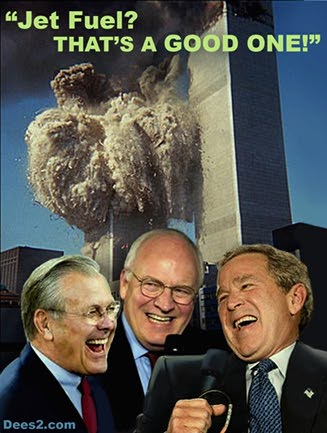– 9/11 Commission’s Forum Shows How DC ‘Works’ (Washington’s Blog, July 28, 2014):
Former members of 9/11 Commission last week leveraged the 10th anniversary of their report to announce a dozen recommendations that primarily fan fears of foreign terrorism.
The former commissioners urged at a July 22 forum strong spending on counter-terrorism intelligence and far fewer congressional oversight committees.
News coverage of the forum avoided mysteries and ongoing disputes. Dissenters like former National Security Council counter-terrorism chief Richard Clarke were long gone and out of sight.
“The fix is in,” the former Bush Administration advisor Clarke recalled telling a White House colleague in January 2003. Clarke told author Philip Shenon for a 2008 book that he had made his “fix” remark upon hearing news that the 9/11 Commission had hired as its executive director Philip Zelikow.
Zelikow, part of the Bush administration transition team, was a fierce opponent of Clarke, a staffer who had unsuccessfully warned about al Qaeda and Osama bin Laden before the 9/11 attacks.
Remarkably, Zelikow also had been co-author before his appointment of a book by Bush’s National Security Advisor Condoleezza Rice, a friend who was vulnerable during the inquiry because of the intelligence shortcomings. After the commission’s work ended in 2004 Zelikow became counselor for Rice from 2005 to 2007 when she held the Secretary of State post.
Whitewash, mistakes and conflict of interest were not topics for discussion at the forum organized last week by the Bipartisan Policy Center in downtown Washington, DC.
Instead, the experts focused primarily on fear and the need for more spending.
“Many Americans,” the former commissioners said, “think that the terrorist threat is waning — that, as a country, we can begin turning back to other concerns. They are wrong. The threat remains grave and the trend lines in many parts of the world are pointing in the wrong direction.”
The speakers said the public should fear terrorism and support vigorous counter-terrorism measures.
Counter-terrorism contractors and their allies in government, Wall Street and the media fear budget cutbacks in an era of austerity, especially because relatively few foreign terrorism threats have been discovered. Most of the plots exposed have revealed deep involvement by undercover federal agents.
This column — cross-posted on the Justice Integrity Project with more detail and citations — shows that 9/11 Commission began with massive conflicts of interest and receives scant press attention for its members’ failure quell public doubts about the 9/11 attack.
- Overview
- The Week’s News
- A Necessary Flashback
- The Short-Lived ‘Kissinger Commission’
- Unfinished Business
- The Final Word?
The commission’s leaders were Chairman Thomas Kean, a Republican former New Jersey governor, and Vice Chairman Lee Hamilton, a Democratic former congressman representing southern Indiana. All of the commission members or their organizations have ties to the federal contractors, Wall Street financial houses and other institutions that prosper from counter-terrorism spending and related efforts.
Naturally, the recipients cycle back part of their revenue from taxpayers to the most supportive lawmakers, thought leaders, and their organizations. Most of the time but not always the process works via indirect means, such as via a law firm or non-government organization.
A Who’s Who of recent intelligence and law enforcement officials at the highest levels helped the former commissioners in their latest research and recommendations.
The commission’s legacy? “The first important thing that’s been done in this town in a long, long time,” responded Kean.
News coverage tends to focus on such self-appreciation, and minimize controversy.
But blunt talk sometimes surfaces.
One such occasion arose during a 2009 book fair at the National Press Club, where Cleland was signing copies of his memoir. Cleland is a triple amputee from Vietnam combat who was defeated by vicious Republican smears in his 2002 re-election campaign for a U.S. Senate seat representing Georgia.
Appointed to 9/11 Commission, he became a wild card. He pushed for subpoenas and asked so many blunt questions that leadership of both parties found a job for him, which he needed. He became a director for the U.S. Export Import Bank, but the post required his resignation before the commission’s final report.
“Do you think there should be another 9/11 commission?” a former Navy intelligence officer asked Cleland at the 2009 book signing.
“There should be about fifteen 9/11 commissions.”

